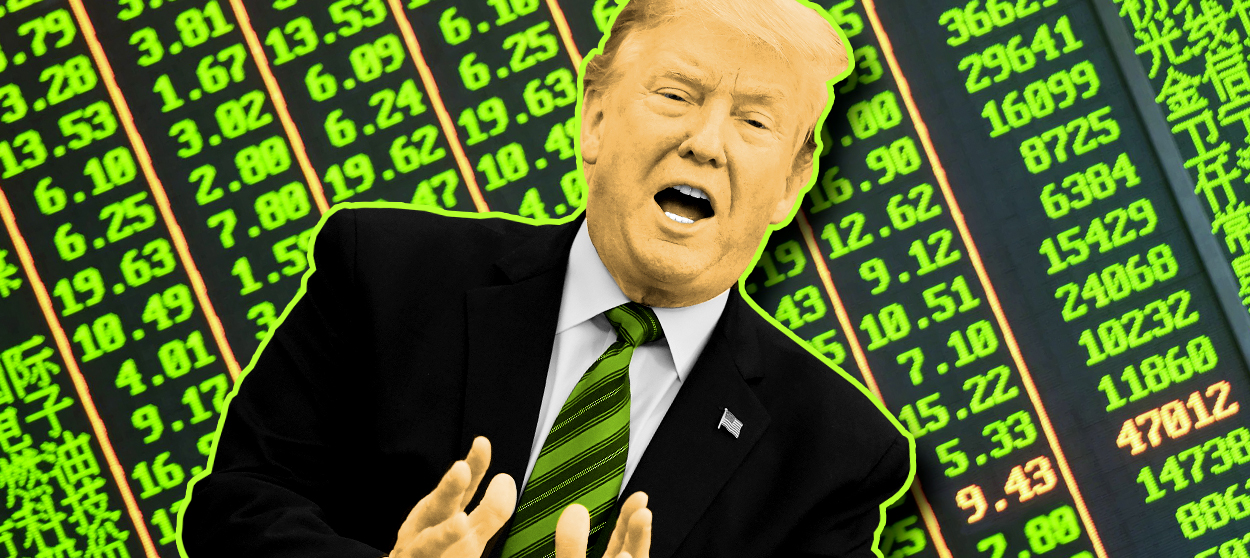Is Trump overplaying his hand on tariffs?
Threatening China will likely get results — but they might not be good


A free daily email with the biggest news stories of the day – and the best features from TheWeek.com
You are now subscribed
Your newsletter sign-up was successful
President Trump decided to bet big on his trade war with China over the weekend.
With talks between the U.S. and China scheduled to resume this week, many observers had been optimistic that a deal was close to being hammered out. But the president, apparently frustrated with the negotiations, threatened Sunday to hike tariffs to 25 percent on virtually all the goods China exports to America. "The Trade Deal with China continues, but too slowly, as they attempt to renegotiate. No!" he tweeted.
Like any big bet, Trump's move could pay off or it could fail spectacularly. And right now it's hard to say which way the chips will fall.
The Week
Escape your echo chamber. Get the facts behind the news, plus analysis from multiple perspectives.

Sign up for The Week's Free Newsletters
From our morning news briefing to a weekly Good News Newsletter, get the best of The Week delivered directly to your inbox.
From our morning news briefing to a weekly Good News Newsletter, get the best of The Week delivered directly to your inbox.
Part of the problem is that the messages coming out of the administration itself are pretty mixed. Treasury Secretary Steven Mnuchin, who was in Beijing just last week, had sounded upbeat, declaring the trade negotiations were in their "final laps." At the same time, sources told the New York Times that Robert Lighthizer, the United States Trade Representative, insists the deal is "not yet good enough."
Then there's the Chinese themselves. According to the Times, Trump's latest tariff threat was a genuine surprise, and they're still figuring out exactly how to respond.
"China is considering canceling trade talks that are to resume in Washington starting Wednesday," the Wall Street Journal reported, relying on several unnamed sources. "Some working-level Chinese officials who were supposed to leave for Washington on Monday were staying put instead, waiting for further instructions."
"The atmosphere of the negotiations has changed," one Chinese official told Reuters. And Tai Hui, an Asia-Pacific market strategist for J.P. Morgan, told the outlet that, "As we learnt a year ago, Beijing could be willing to walk away if the U.S. applies negotiation tactics that they don't agree with. That said, both sides have invested significant time and resources to come this far."
A free daily email with the biggest news stories of the day – and the best features from TheWeek.com
Another interesting twist on the Chinese side is their trade envoy, Liu He, who has apparently been arguing within his government for a while that China should reform itself along at least some of the lines the White House is pushing for. He has some support within China's government bureaucracy, and Trump's latest threat could give the Chinese envoy more leverage to press for those changes at home.
In other words, there doesn't appear to be much agreement anywhere regarding how much progress is actually being made.
If you're inclined to believe Lighthizer, Trump's sudden threat maybe makes sense as an effort to shake things loose. But if Mnuchin is right, then it seems much more like misguided grandstanding that could ruin successful negotiations. Meanwhile, the Chinese themselves are apparently divided, with equal potential for Trump's threat to empower reformers or drive the Chinese from the bargaining table entirely. It doesn't look like anyone knows quite what to make of Trump's strategy here, or even if there's any strategy at work at all.
Finally, there's the deal itself.
Two big focuses for the U.S. have been rolling back China's subsidies for many of its own domestic industries, and ending China's policy of requiring foreign companies who do business in China to partner with a Chinese firm — a practice that generally requires sharing technology and trade secrets with the partner. The Chinese have reportedly resisted changes in any of these areas that would go so far as to actually require changes to Chinese law. From that aspect, Trump's frustration makes a certain amount of sense.
At the same time, the U.S. is also demanding a unilateral right to hike tariffs on China in the future, if they feel the deal isn't being upheld, and they want to forbid China from being able to hike any retaliatory tariffs in that circumstance. Beyond that, the larger sweep of neoliberal free trade norms America is trying to impose will effectively place China in a no-win position regarding its own economic development. You could understand if the Chinese were already on the verge of walking away from that sort of lopsided setup.
Finally, if Trump's ultimate goal is to raise jobs and wages for American workers, the focus on technology transfer is largely beside the point. Cracking down on those policies will generate returns for U.S. shareholders, but little in demand for more American jobs. The additional purchases of U.S. exports that negotiators are asking for are unlikely to plug the trade deficit long-term, compared to reforming Chinese and American currency policies. But the currency angle seems to have dropped out of the White House agenda entirely.
Basically, even if Trump's latest big tariff bet pays off, it's not clear what he wins. The White House will get a reputation bump among government and business elites for closing a deal. But without much of a material boost to everyday voters, how much is that worth? Meanwhile, if Trump's bet fails, he'll be left with no deal and an unending trade war.
The whole thing is really quite a mess.
Jeff Spross was the economics and business correspondent at TheWeek.com. He was previously a reporter at ThinkProgress.
